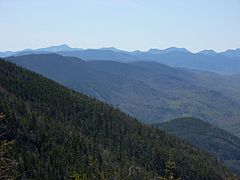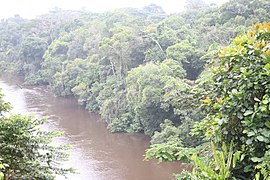Geisenroda
People's Republic of Geisenroda Volksrepublik Geisenroda (Gothic) | |
|---|---|
Motto: Tradition, Sozialismus, Gemeinschaft ("Tradition, Socialism, Community") | |
Anthem: Ein Soldat hat es nicht leicht | |
| Capital and largest city | Saalfeld |
| Official languages | Gothic Hendalarskisch |
| Religion | Coscivian Orthodox Church |
| Demonym(s) | Geisenrodan Gaisen |
| Government | Unitary Semi-Constitutional Monarchy under a Socialist Republic |
• Kaiser | Ernst Orndorff |
• Chancellor | Konrad Ruhl |
| Legislature | Unicameral |
| Volkskammer | |
| Establishment | |
• Declared | 1940 |
| Population | |
• Estimate | 181,545,072 |
• Census | 2035 |
| GDP (nominal) | estimate |
• Total | $4.17 trillion |
• Per capita | $22,990 |
| Gini | 24.2 low |
| Currency | Mark (ℳ︁) |
| Driving side | left |
| Calling code | +850 |
| Internet TLD | .gra |
Geisenroda, officially the People's Republic of Geisenroda, is a country in Levantia. It is neighbored by Hendalarsk to the north and shares a naval border with Kiravia to its south. Geisenroda has a population of 181 million, largely consisting of Gothic people's though with a sizable minority of both Celts and Coscivians. Religiously, Geisenroda possesses one of the largest populations of Coscivian Orthodox Christians in the world, however, small populations of Gothic pagans still exist in the country, along with various branches of Protestantism. The nation consists of eight states operating in a unitary structure.
Geisenroda's history can be traced back to the various Gothic barbarian tribes that once inhabited the area, the first established kingdoms of the area can be traced back to the Gothic Middle Ages, around 720-730 AD. The first evidence of Coscivian Orthodoxy making its roots in the country can also be found around the same time, however, due to the already rather deep-rooted nature of the faith that is mentioned in many sources describing the kingdoms, it is commonly accepted that the religion can be dated back to the Gothic barbarians' raids on ancient Kiravia's eastern shores, the setting up of outposts on the continent and then bringing the faith back to their tribes is the most commonly accepted version of events. Despite the general trends of increasing approachment to the Levantine Empire and Catholicism becoming more accepted in Gothic societies, the then unified kingdoms of ancient Geisenroda rejected these actions and favored a more isolationist and Gothica-centric policy along with increasing persecution of Catholics in the territories. The kingdom's refusals to modernize lead to them being absorbed into several different kingdoms and empires in its lifespan, until a Kiravian backed insurgency made the country independent again in the late 1500's. TBA
Geisenroda's modern history has been known for the country's diplomatic isolation and widespread though relatively moderate sanctions against it, largely by members of the Levantine Union and UNESARP. The country has been under the rule of the United Socialist Party - National Front (USP-NF), as a dominant party system, since the mid-1990's. The state is one of the worlds few planned economies with state owned companies dominating the economy, alongside heavy protectionism and regulations, though private enterprise at a small level is allowed. Since the countries return to socialism it experienced a period of economic recovery and stability from the depression following the attempts at economic shock therapy, however in the following years the country experienced a sharp economic decline with their voluntary default on their foreign debts followed by slow, often below 1% economic growth following the default and the beginning of the application of sanctions, however in recent years economic growth has returned to normal levels. Kiravia has remained a strong and steadfast ally of the country in recent history however and has assisted the country economically and diplomatically. In 2028 Geisenroda withdrew its member status at the League of Nations, referring to the organization as "Fascist, globalist, and imperialist".
Etymology
Why is your country called what it is? What is the source of that word or phrase?
History
What is a general overview of your country's path through history?
First era
How was your country originally settled?
Second era
What were the first political structures of your country? Did it have any very early rivals or was it controlled by a foreign country?
Third era
What were your country's first major moves on an international level?
Fourth era
Did your country ever have a period of significant decline or internal struggle?
Fifth era
Was your country subject to imperialism later in its life, or was it an imperial power?
Sixth era
How did the 20th century affect your country?
Geography
-
First lovely location
-
Second lovely location
-
Third lovely location
-
Fourth lovely location
-
Fifth lovely location
-
Sixth lovely location
What is the general explanation of how your country exists within the world?
Climate and environment
Is your country hot or cold?
Government and Politics
How is your country ruled or governed?
Executive
Who is responsible for making high level choices in your country? Does it have a President or King?
Legislative
Who decides the laws for your country? Is there political parties and a legislature?
Federal subdivisions
How is your country divided? Are there states or provinces, or is the country directly governed from the capital as a unitary state?
Politics
What political factions exist? Who has ruled predominantly?
Law
What kind of laws and legal system does your country employ?
Demographics
What kind of people live in your country?
Ethnicity
What ethnic groups make up your country?
Language
What language or languages do your country's people use? Are there any previously used languages no longer common? Are these languages native to your country or shared with another?
Religion
Religious affiliations in Geisenroda (2035)
What do your country's people believe in religiously, if anything? How many groups are there?
Education
How many people in your country are educated?
Culture and Society
What do your people do, and what are they like?
Education
What is your country's education system like? How do the schools work? What do people think about education?
Attitudes and worldview
How do your country's people view life?
Kinship and family
How are families or kinship groups structured in your country?
Cuisine
What do your people eat?
Religion
What do your people believe? Rather than demographics, as above, think about how important religion is to your people and their view about their own and other religions. What is the relationship between the prevailing view and minority religious groups? Is it an official religion, and do any laws exist about free worship?
Arts and Literature
What type of art do your people make? Do they have a tradition of painted art, well-crafted television shows, or great music?
Sports
Does your country have any major sports leagues? What types of sports are played, both professionally and for fun by your country's people?"
Symbols
Are there any prominent symbols which are well known to represent your country?
Economy and Infrastructure
How does your country's economy work?
Industries and Sectors
What are the largest parts of your economy in terms of what they do?
Currency
What exchange systems are used within your country's economy?
Healthcare
How do people in your country procure medical care? How is it paid for?
Labor
How is labor organized within your country? Are there any social institutions or unions which deal with labor concerns?
Transportation
How do people in your country get around? Is there a major highway system as well as sea- and airports?
Energy
What type of energy keeps your nation going? Are you renewable or use fossil fuels, and if you are renewable, how recently did your country transition?
Technology
How advanced is your country? Is it an innovator, or does it largely import new developments?
Military
How large is your country's military? Is it large but poorly equipped or small and elite? Does your country have a martial tradition?







